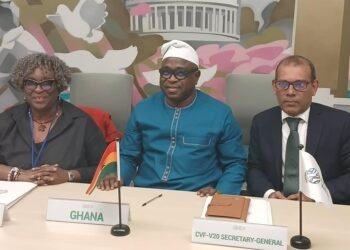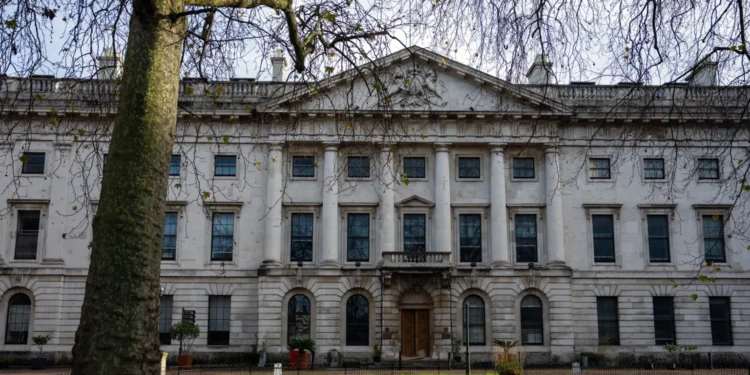Ghana is set to kickstart the preparation of its Long-Term Low Emissions Development Strategy (LT-LEDS). This national initiative, under the auspices of the National Development Planning Commission (NDPC), intends to align the country’s climate action with its broader development priorities.
The process was officially launched at the National Inception Workshop on Ghana’s LT-LEDS, where the Director of Research at NDPC, “Mr. Richard Tweneboah-Kodua, delivered an address on behalf of the Director-General”. This move, is a significant step towards the country’s sustainable and climate-resilient future.
“He noted that Ghana’s preparatory work, supported by the 2050 Pathways Platform, has produced an annotated outline and a set of proposals to guide the LT-LEDS formulation, while highlighting the country’s sustained commitment through foundational documents such as the Climate Prosperity Plan, Ghana’s Long-term national development framework, and the National Energy Transition Framework.”
NDPC
The preparatory work that has been undertaken, supported by the 2050 Pathways Platform, which has yielded a set of frameworks to guide the LT-LEDS formulation.
The National Development Commission (NDPC) emphasized Ghana’s sustained commitment to this endeavor, highlighting that the country has laid the groundwork through foundational documents including the Climate Prosperity Plan, the Long-term national development framework, as well as that of the National Energy Transition Framework.
Climate Action and National Development

The NDPC as an obliged institution, has the responsibility of ensuring that climate change is integrated into national development planning though positioning the LT-LEDS and the nationally determined contributions (NDCs) with Ghana’s development frameworks, such as the Coordinated Programme of Economic and Social Development Policies (CPESDP) as we as the Medium-Term National Development Policy Framework (MTNDPF).
The commission viewed the initiative as a nationally-led process targeted at aligning country’s upcoming NDCs 3.0 with a robust, context-specific LT-LEDS.
“He further described the initiative as a nationally-led process aimed at aligning Ghana’s upcoming NDCs 3.0 with a robust, context-specific LT-LEDS whiles emphasising that the strategy is rooted in the Paris Agreement and reinforced by COP27’s call for countries to submit their LT-LEDS by COP28.”
NDPC
Effort and Stakeholder Engagement

The responsibility for the policy and operational management of the LT-LEDS initiative is a shared one between the Ministry of Environment, Science and Technology (MEST) and the Environmental Protection Authority (EPA) as its agency.
Professor Nana Ama Browne Klutse, the CEO of EPA, and Hon. Emmanuel Armah-Kofi Buah (MP), the Minister of MEST, have both demonstrated a strong commitment to owning the process and the expected outcome.
On behalf of the EPA CEO, Mr. Felix Addo-Okyire, the Director of the Climate Change and Ozone Department, highlighted the key drivers of climate-related impacts, including increased carbon dioxide emissions and that of the global warming.
He admonished the development partners, the private sector, and the general public to corporate with the EPA to safeguard and protect the environment as the country moves towards low-carbon, climate-resilient growth.
The workshop engaged various national stakeholders to gather insights and contribute to the development of a robust, context-specific LT-LEDS that is aligned with Ghana’s NDCs and development priorities. This inclusive approach ensures that the strategy reflects the diverse needs and perspectives of the Ghanaian people.
” The Authority further emphasised that the strategy will reflect key areas such as agriculture and food safety; disaster preparedness and response; natural resource management; energy, industrial and infrastructure development, with the aim to close policy gaps and promote equitable development social development.”
NDPC
Sustainable Future

The launch of the Long-Term Low Emissions Development Strategy underscores a significant step in the country’s willingness and commitment to addressing the pressing issue of climate change and transitioning towards a low-carbon and a resilient economy.
By aligning this strategy with its national development frameworks, Ghana is positioning itself as a leader in the global effort to mitigate the impacts of trending climate change and promote sustainable growth.
The collaborative nature of this initiative, involving key government agencies i.e MEST, EPA, etc., development partners, the private sector, and the general public, signify the importance of collective action in tackling the complex challenges posed by climate change.
As Ghana treads on this trajectory, the National Development Planning Commission (NDPC), the Ministry of Environment Science and Technology (MEST), and the Environmental Protection Authority (EPA) remain steadfast in their determination to deliver a greener, more prosperous future for the nation.






















